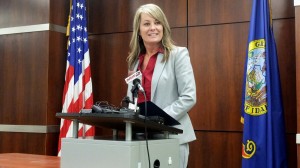Superintendent of Public Instruction Sherri Ybarra will push for a 6.4 percent increase in public school funding, slightly less than the 7.4 percent boost sought by Gov. Butch Otter.

Otter’s budget team and State Department of Education staffers built their respective budgets in different ways, so comparing the two side by side is difficult. But a few differences emerge between the two elected Republicans. Ybarra wants to boost operational money for school districts, for example, while Otter wants to put more money into professional development.
On Monday, Otter outlined a blueprint to increase public school funding by $101.1 million in 2015-16. Ybarra will ask for a $87.1 million increase.
After Otter delivered his State of the State address and budget request, Ybarra’s staff released an overview of her budget request – honoring a promise she made to reporters during her news conference last week.
Ybarra doesn’t officially present her budget request until Jan. 29, but the documents her office released offer the greatest insight yet into her legislative and funding priorities.
On one key area, Ybarra and Otter’s budgets are nearly in agreement — even though there are differences in the way they crunch the numbers. Otter and Ybarra want similar funding to begin phasing in a career ladder form of teacher pay, replacing the state’s existing salary grid.
Tim Hill, who works on public school finance at the SDE, said Ybarra seeks $32.9 million in funding for the career ladder if her budget is presented and calculated the same way as Otter’s. Otter asked for $31.9 million for the career ladder.
The differences, Hill explained, involved where some money appears in the budgets, and whether the money is grouped together or spread out in different line items. Ybarra and Otter also relied on a different number of support units – sometimes referred to as classroom units – when calculating their budgets, Hill said.
Ybarra fully supports funding the career ladder, spokeswoman Melinda Nothern said Tuesday afternoon. However, Ybarra still has concerns about the policy and implementation, and continues to discuss a potential pilot program.
Tim Corder, a special assistant to Ybarra, said one idea involves a pilot program at three districts of different sizes in different parts of the state.
Plenty of questions surround the career ladder, and the Legislature will ensure the policy and funding equations align, he said.
On Tuesday afternoon, Ybarra said any unused money from the career ladder proposal could be put aside for future budget years “until you work out all of the bugs with a pilot program.”
Otter says he considers the career ladder and tiered licensure plans inseparable, and he wants both to move ahead this year.
In other budget differences:
- Ybarra wants to increase operational funding by about $28.8 million, compared to Otter’s request for a $20 million increase. Ybarra would increase per-classroom operational funding to $24,160.24, while Otter would fund $23,659.55. Both levels fall short of the $25,696 per classroom level from 2008-09.
- Ybarra is seeking $8 million for professional development, well below Otter’s request. Otter’s budget writers peg his request at $17.6 million, while Ybarra attaches a $21.6 million price tag to Otter’s request. On Wednesday morning Corder added that $13.56 million of the money in the discretionary spending portion of Ybarra’s budget will be available for districts for professional development. That brings the professional development total within Ybarra’s budget request to $21.56 million. However, because that funding is part of the discretionary funding pool, district leaders will be able to use that money however they see fit.
- Otter asked for $2.5 million for college and career counseling for Idaho students, but Ybarra does not ask for any money in that area.
- Otter seeks $752,000 for school board leadership training and another $400,000 to fund a pilot program testing out a new mastery-based system of education. Ybarra would not fund either program.
